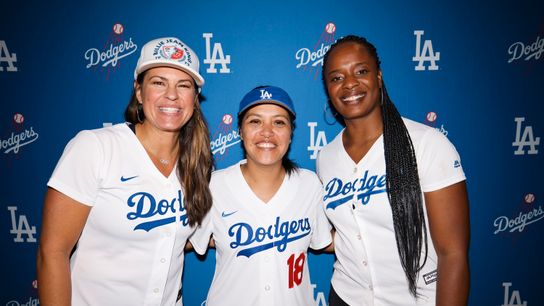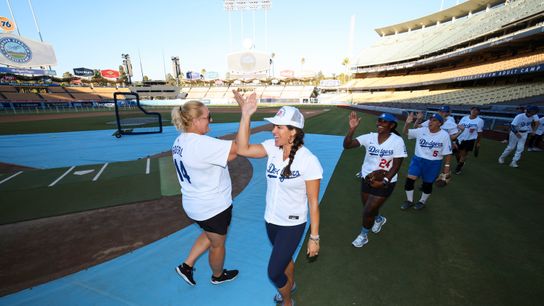
Los Angeles Dodgers
Jessica Mendoza, a broadcaster with the Dodgers and former college softball star, helped to organize a softball event at Dodger Stadium last weekend.
LOS ANGELES — It’s Time for Dodger…Softball?
As this week’s critical Dodgers-Padres series was in full swing, Dodgers broadcaster Jessica Mendoza took a break. Arriving at a bustling press box at Chavez Ravine – where the on-going storyline of how superstars Shohei Ohtani and Manny Machado will impact "How The (N.L.) West Was Won" – was in overdrive, Mendoza was also looking ahead.
Last Sunday, as the Dodgers wrapped up the regular season schedule in Colorado, softball was the game at Dodger Stadium. Mendoza, an Olympic gold and silver medalist and Natasha Watley hosted the inaugural Dodger Stadium Adult Softball Camp.
Nearly sold-out, the popular day-long event allowed participants to play on the field, exclusive use of facilities and enjoy a personalized locker complete with a customized Dodger jersey.
A Stanford graduate, who calls select Dodger games on Spectrum SportsNet (Mendoza also works as a national analyst with ESPN), she talked with The Sporting Tribune on a variety of subjects:
TST: This camp is focused more on adult play. So many young people, however, play the game. Parents often have high expectations for their kids in terms of athletic success both now and into the future. What advice do you have for them?
Jessica Mendoza: That is something we can write an entire book on. We can make a movie out of the expectations of parents in sports. Now we talk about mental health more in youth sports, which is a very hot topic.
The biggest thing I would tell parents is to love your kid. It is simple – love and encourage your kids. These expectations now are coupled with the access to so much information – even at youth tournaments with radar guns, and being all about results and production – should make a shift to it being more about fun.
Sport is about why we play the game. We are not expecting to be professionals. The better you get leads to there being more of a business side to it, but this is a small percentage and mostly older kids. Not youth sports. I feel strongly parents should not be pushing as much as they do. Support is the key word.
TST: Did it ever not be fun for you?
JM: Yes. There were multiple points for me and it started at the high school age. I was 13, 14 years old and my love for the game was starting to go away. I was playing up with older girls, and our travel team had people traveling to us to be part of the team. Our team was supposed to be a super team and everyone was so serious.
I once tried to give a high-five, and I remember the looks I got. I remember the looks I got when I would tell jokes. The vibe was, "No, we are here to win." I was taken aback. I want to win, I am very competitive, but winning isn’t fun if you are isolated and in your own silo.
I did not want to play anymore because it was not fun. I felt constant pressure and not the good kind of pressure. My parents were awesome in recognizing that it was more the team than the sport.
TST: What else then changed?
JM: My parents and I talked about not quitting the sport altogether. We tried another team. It was more local. We weren’t initially as good but we ended up being better because we were friends and the same age and I realized, ‘Oh my gosh, I love this game.’
When I was on the Olympic team, I also was putting so much pressure on myself that it wasn’t as fun. I always tell people to get back to the core of why you play. It is not about hitting home runs. You can’t live up to that everyday. So find other reasons why you play and remember those,
TST: Girl sports, women in sports, continue to increase in prominence on a national level. Is there a single moment, or athlete, or even a business decision that you recall which sort of flipped-that-switch to help get to where we are now?
JM: It has been multiple moments. Look at Billy Jean King more than 50 years ago. I wasn’t even alive but that was huge. It showed we can be winners, and winners and on a massive stage with people watching. That coincided with Title IX. Huge. Pivotal.
Then you have athletes like Serena Williams. She showed muscle and strength. She told us that it’s good to be confident. Give a fist-pump, stare down an opponent. If that is what you are, then be strong. You don’t always have to be humble or shy or play down how good you are.
TST: Do you also see and appreciate that away from sport?
JM: Look at the entertainment industry. Look at music, where you have these songs. Beyonce and Taylor Swift and more are singing about hearing me roar, and I am a bad-ass, and I am here to stay.
I look at Senera in sport in that area but also movies and television. I look to the movie Frozen. Yes, it is a Disney cartoon movie but it is two girls finding sisterhood. I saw this all happening at around the same time and knew it was a moment we had been feeling, but now you are seeing it successful at the box office.
Those in marketing realized they should have been doing this a long time ago.
TST: Do you ever envision hitting a point in your broadcast career where people won’t even know your own athletic success/background in softball?
JM: I hope not because I hope that softball continues to rise. I continue to cover that but also you see the growth with something like Athletes Unlimited. There is growth there and I was recently on a call about the Olympics and Los Angeles.
There is a lot happening there but I want people to always know me as a softball player, and to never be “Jessica The Broadcaster.’ I love what I am doing within broadcasting and within baseball, but I also love that I am a female athlete doing it. It’s important to raise women's sports. It’s more than being a great broadcaster. The background in athleticism one brings to their sport is important.
TST: On the Dodgers broadcast team, who is the best athlete?
JM: I want to immediately say Kirsten Watson. She was a Division 1 volleyball player. She is our reporter and I think people forget that about her.
I would need to see the versatility of everyone but I want to say Nomar (Garciaparra) because he was also a great soccer player. I know the appreciation he has for his wife Mia Hamm but I have also seen him play soccer.
Also when I was training for the Olympics he used to pitch to me. We would hit. It was fun to actually play with him. I think when you are a multiple sport athlete like he was, there is natural athleticism with him. I think playing baseball is one thing. But to do all the sports he did, he gets my vote.
TST: We are not going to ask you who the worst athlete is. But, maybe, who might need the most help to reach the top of their athletic prowess?
JM: I need to see more of them. Take someone like Orel (Hershiser). We know of him as The Bulldog. He can pitch and he can field his position better than anybody. But I just don’t know. I can’t answer that one.
TST: Are you factoring in Orel’s smooth dance moves on those car dealer TV commercials he is featured in?
JM: Joe Davis is actually the one who makes me crack up more in those commercials – more than Orel even.
TST: And finally, two baseball questions. Fast forward to the MLB postseason. What is something specific, in your opinion, the causal Dodgers fan should key in on early which might be an indicator to future playoff success?
JM: I think the bullpen of late has been so impressive. Everyone wants to talk about the starting pitcher, and we know the status of Clayton Kershaw and Tyler Glasnow, but the starting rotation and lack of big name stars does sort of change I think come October.
Watch the games now in October and, yes, starting pitching is important but they seem to go four innings, or twice through the line-up if that. It is about match-ups and knowing the Dodgers and what Michael Kopech has been doing, and then you see a guy like (Edgardo) Henriquez get called up and he throws 101 miles per hour. Brusdar Graterol is coming back and Blake Treinen is pitching well, and I get excited about bullpen match-ups in the playoffs.
It isn't as sexy as talking Shohei and our line-up, but to me it will come down to the bullpen and decisions. Dave Roberts will decide how to use and manipulate the bullpen, and that is what will win games.
TST: Do you buy into the storyline that it is ‘World Series or bust’ for the Dodgers?
JM: It’s been like that here for a decade. I think everyone understands it. It is the World Series or bust. It has been 2020 and nothing outside of that.
I want to get to the World Series. Yes there was 2017 and there was Houston and all of that as well. I think getting to the World Series and being the best team in the National League is something this team would be incredibly proud of. Of course they want to win the World Series, but I feel with the division series and how hard that has been to get through, I think there is an appreciation of the expectations but there is also not an assumption.
For more than 20 years, Jeff Moeller has been a voice in the Southern California pro sports community. This is his second piece for The Sporting Tribune as he contributes to the website on a semi-regular basis. A huge baseball fan, he still cannot believe Tommy Lasorda took a photo with his son … who was wearing an Angels t-shirt. Visit Dodgers.com/softball for more details.
